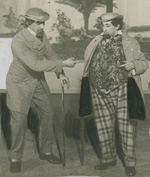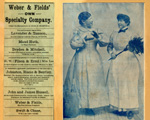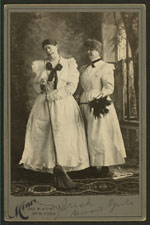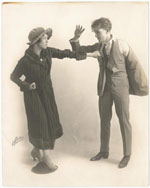The New York
Public Library for the Performing Arts > Vaudeville
Nation
Character Comics

Joe Weber and Lew Fields
in performance.
Photograph by
Byron,
NY, ca. 1900.

Photograph of John and
James Russell in Maids
to Order,
their vaudeville
impersonations of Irish
immigrant maids,
1901,
with program for
Weber & Fields'
combination.
Townsend
Walsh Collection.

The Russell Brothers in
character as Irish maids.
Photograph
by Miner, NY, nd

Photograph by Ryan & Lee.
In the late 19th century tradition, most comics
worked in make-up and accents to become "Dutch" or Irish
characters. The most famous "Dutch" (meaning German, from
Deutsch) teams included the Rogers Brothers and (Joe) Weber & (Lew)
Fields. Both teams combined word play based on mis-pronunciations
with physical comedy comparable to the Three Stooges. Weber & Fields,
especially, were known for their mock battles. The Rogers
Brothers adapted their act into a series of successful Broadway
musicals, which also toured as tab shows.
The traditional make-up for Dutch comics included a short,
stiff beard, leading to this typical piece of repartee:
"If it wasn't for one thing, I'd call you a bald-faced liar."
"What's that?"
"Your whiskers."
That, and the following jokes were reprinted in "Grand New
Jokes of the Funniest Comedians" in The NY Journal's
rotogravure section, Sunday, October 2, 1898. Although the
jokes are not specifically credited, the article is illustrated
with pictures of Sam Bernard, David Warfield, Lew Fieldls,
Joe Weber and Walter Jones, then all working as Dutch comics
or their straight men.
"They say barking dogs don't bite. You know it and
I know it, does the dog knows it?"
Mr. C - At one time in my life I was a lawyer.
Mrs. J - What is a lawyer?
Mr. C - A lawyer is a man who gets money from your enemies
and keeps it for himself.
"Did you ever back a horse?"
"Yes, I did, once in my life."
"Did you win or lost?"
"I lost fifty dollars."
"How's was that?"
"I backed him into a store window."
"There are no fools in my family."
"Sir you forgot yourself"
A Woman Customer - Where can I buy powder?
The Shop Walker (i. e. clerk)- Face, gun or bug, madam?
Weber & Fields were together and separately vital to
American theatrical history for their revues in the early
1900s and Fields' musical comedies in the 1910s and 1920s.
Irish immigration flourished in the mid-19th century
and with it, Irish performers. There was a strong vocalist
and musical comedy tradition in the New York theater and
on the tour, exemplified by balladeer Chauncey Olcott and
the Harrigan & Hart musicals. Unlike the Dutch comics,
the Irish dialect comics in vaudeville tended to be female
characters. John and James Russell developed characters
as Irish maids that allowed them to satirize new immigrants,
Americanized society, and new inventions like the telephone.